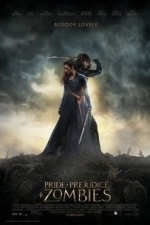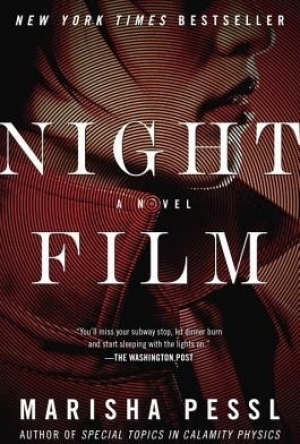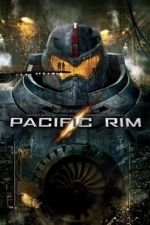Olafur Eliasson: Reality Machines
Daniel Birnbaum, Matilda Olof-Ors and Ann-Sofi Noring
Book
Olafur Eliasson: Reality machines was conceived and designed by Irma Boom, one of the world's most...
Emma @ The Movies (1786 KP) rated Pride and Prejudice and Zombies (2016) in Movies
Sep 25, 2019
A mysterious plague has fallen across England. The countryside is a relative haven, where the city has become a playground for unmentionables. The oriental arts have become the fashion and a desirable young lady no longer needs to be the prim and proper wife, unless your name is Mr Collins.
The Bennet's lovely daughters, beautiful and strong of body and mind are accustomed to a regimented life of training, until the handsome stranger Mr Bingley comes to the country. A whirlwind of romance and the undead lead them into a battle for family and love.
Heaving bosoms, country estates. Brain eating corpses and assorted weaponry. Everything you'd expect when the undead meets Jane Austen. As if on cue my playlist has shuffled to Zombie by The Cranberries. I can't deny enjoying this film, I should point out that I was always going to enjoy it, be it Oscar or Razzie worthy. It definitely had the potential to be an epic re-watchable classic or the B-movie winner that shone from the book.
When it was first published I picked it up almost instantly and soon found Quirk Books and other crossover books developing a little shrine-like area. [Now given pride of place in my nerd room.] Having a dislike of classics embedded in me from school and enjoying the general kick-assery of action films, it was a great crossover to bring those classics back into my life.
Admission time, while I've read the book I can't actually remember when, it was dozens of books ago. I loved it but not everyone did. I'm going to make a big sweeping statement. [Sorry, not sorry] It's not a Jane Austen book people, get over it. "He's ruined Elizabeth Bennet!" No he's taken a strong minded female character and put her in a new fantasy setting. I'm sure there would have been less objections if all the names were different (and the title too) and it was just described as "loosely based on Jane Austen's Pride and Prejudice". But swings and roundabouts, because it probably wouldn't have been as popular if it wasn't called Pride and Prejudice and Zombies.
Sam Riley's Mr Darcy was no Colin Firth, but it was still very good. It did kind of seem like they threw him in a lake because they felt they should pay homage to Firth's dunking.
Note to those who see the film, Liz Bennet's heaving bosom is seen on a regular basis and is entirely distracting. I'm not sure there's a plot line linked to them, they're just always there, they probably should have got their own credit for the part.
I think my favourite scene was where Darcy came to Elizabeth to proclaim his love... and then they proceed to beat each other with sticks, books, basically whatever is to hand. Heated and packed with sexual tension it made for entertaining viewing. It also reminded me of the scene in Buffy where the slayer and Spike fight in an abandoned building, and the amount of sexual tension between the pair results in breaking the building, amongst other things... but those other things probably wouldn't work so well in Austen's time.
Even with all the bits that brought a smile to my face and made for enjoyable watching, there were some things I couldn't help but be annoyed with.
Firstly, Matt Smith, my dear number 11... [insert long silence here] I know Mr Collins is there for the annoying comic relief and awkwardness but oh my god. It was too much and I was overcome with annoyance. The cast is made up of relatively unknown people, with the exceptions of Charles Dance, Sally Phillips and Matt Smith. I can't help but wonder if Mr Collins would have been easier to deal with if he was an unknown actor.
The camera work had its own peculiarities. Some shots were taken from the zombies point of view. They were blurred and frustrating to watch, I can't really tell what it added. I'm sure it would have added a bit more drama if you'd seen the potential victim being run at. Again, I'm not an expert in showbiz filming but I'm fairly certain that making your audience want to throw up is not the idea. Right near the end there is a shot that perfectly portrays the devastation of the situation...
"How should we get across the devastation of the city and cut out to the next scene?"
"Spin the camera round until people want to vomit?"
"GENIUS!"
I sat there feeling a bit woozy, trying to avoid looking at the screen for the whole thing. I'm not sure either of the fancy styles really improved anything.
My only other wonder about the film is whether it should have gone all out spoof. This was a sensible spoof [relatively speaking], in that it wasn't made specifically for laughs. It did have some, but there were also some moments of emotion too. Should they have played the film out for more comedy? Who knows, but I feel the scene where Darcy and Elizabeth are stabbing a field to kill zombies that are buried underneath was completely wasted in a sensible spoof!
All in all I did enjoy it, but for those of you looking to see it at the cinema I'm not sure it's worth a £10 ticket. Well worth it if you have an offer of some description though. Just remember going in to it that it isn't Jane Austen, it's just your run of the mill zombie period drama... wow, never thought I'd say that sentence.
Hag 12 Down (6 KP) rated Night Film in Books
Dec 30, 2017
On a damp October night, the body of young, beautiful Ashley Cordova is found in an abandoned warehouse in lower Manhattan. By all appearances her death is a suicide - but investigative journalist Scott McGrath suspects otherwise. Though much has been written about the dark and unsettling films of Ashley's father, Stanislas Cordova, very little is known about the man himself. As McGrath pieces together the mystery of Ashley's death, he is drawn deeper and deeper into the dark underbelly of New York City and the twisted world of Stanislas Cordova, and he begins to wonder - is he the next victim?
This is a page turner that makes you want to be in the mystery. You will want to watch the Horror films yourself.
Awix (3310 KP) rated Pacific Rim (2013) in Movies
Feb 25, 2018
Anyway: big monsters lumber out of the sea, get smacked in the mouth by giant robots. Story isn't really anything special, but the background details of this slightly cartoony world are engaging, as are some of the supporting performances. Film subscribes to the prevailing American dogma, which is that giant monster fights must take place at night and preferably in bad weather: apparently this makes them much more believable. The Hong Kong battle is terrific, the others not so much. In the end I think the premise of this movie is really much better than the way it is realised; maybe the sequel will address some of the shortcomings here.
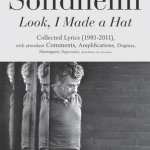
Look I Made a Hat: Collected Lyrics (1981-2011) with Attendant Comments, Amplifications, Dogmas, Harangues, Digressions, Anecdotes and Miscellany
Book
As he did in the acclaimed Finishing the Hat, Sondheim richly annotates his lyrics with personal and...
Cinema and Sacrifice
Book
Cinema has a long history of engaging with the theme of sacrifice. Given its capacity to stimulate...
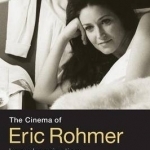
The Cinema of Eric Rohmer
Book
Since the death of the French film director Eric Rohmer in 2010, interest in his work has reignited....
Tracking Color in Cinema and Art: Philosophy and Aesthetics
Book
Color is one of cinema's most alluring formal systems, building on a range of artistic traditions...
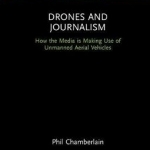
Drones and Journalism: The All Seeing Eye
Book
Drones and Journalism explores the increased use of unmanned aerial vehicles, or drones, by the...
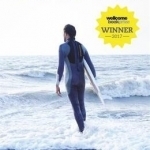
Mend the Living
Maylis de Kerangal and Jessica Moore
Book
Shortlisted for the Wellcome Book Prize 2017. Longlisted for the Man Booker International Prize...

